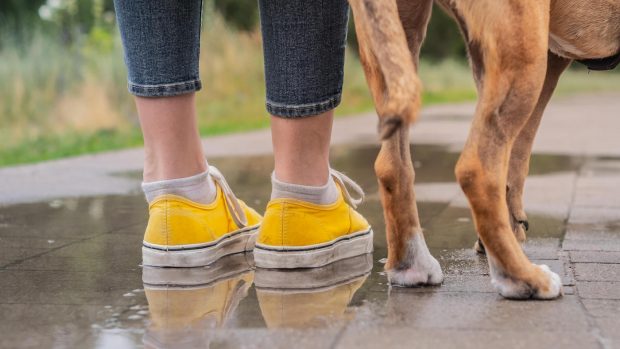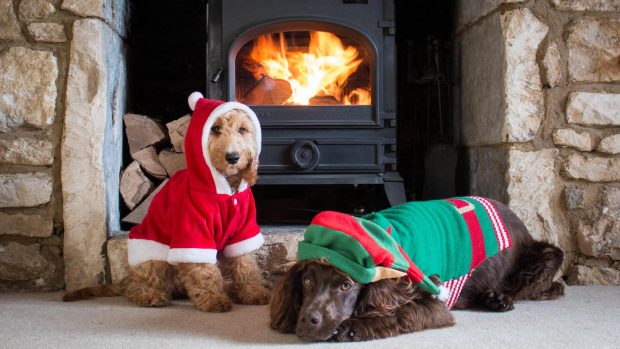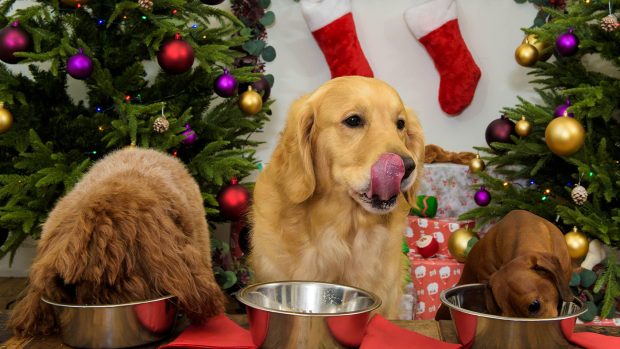The statuesque Rhodesian Ridgeback was originally developed as a scent hound in South Africa to track a variety of game. When this hound breed was taken to Rhodesia – now called Zimbabwe – several hundred years ago, it was used largely for tracking lions, fast on the scent, athletic in tracking and courageous in holding the lions at bay until the hunters arrived (the dogs did not kill the lions). It was previously known as the African Lion Hound.
They would also protect their owners, from other dangerous animals such as leopards, and could course other prey such as antelope to provide dinner for the hunting party. They were bred to be able to run alongside mounted hunters all day long under the hot African sun.
The Rhodesian Ridgeback is a result of crosses between the native ridged Khoikhoi dog and European breeds brought over by Dutch colonists. The local blood gave this new breed a natural resiliency against the tsetse fly (which can cause fatal disease) as well as its ability to cope with heat.
The breed’s name derives from a ridge of hair growing in the reverse direction along its spine. According to canine folklore surrounding the Khoikhoi dog, a well-defined ridge was a sign of courage. Another distinctive feature is their colour, which comes in all shades of wheaten, from light golds to rich reds.

The ridge of hair growing in a contrasting direction along the spine is clearly visible. It was said to denote courage
Rhodesian Ridgeback dog breed: fact file
Kennel Club breed group: hound
Size: large
Daily exercise: more than two hours
Coat: short, shedding
Colours: wheaten, light wheaten and red wheaten. Eyes harmonise with coat colour.
Lifespan: more than 10 years
Bark: rarely barks
History: previously known as the African Lion Hound, this scent hound was bred to track big game in South Africa and Zimbabwe (then Rhodesia). The breed was developed from local Khoikhoi dogs crossed with European breeds such as greyhounds, mastiffs, bloodhounds and terriers.
Distinctive features: the defined ridge along the back where the hair grows in the opposite direction to the rest of the coat. Their overall appearance is handsome, strong and muscular. Athletically built for endurance, but also speed.
Temperament: dignified, intelligent and aloof, yet confident. Neither aggressive nor shy.
Things to consider: the Ridgeback is a statuesque and imposing dog at full size, and should accordingly be fed one of the best puppy foods for large breeds to allow it to develop correctly. It will also benefit from one of the best large dog beds to give him ample space to stretch and snooze. They have high exercise needs, so be prepared to give them plenty of regular, vigorous exercise to keep them happy and healthy.
Training: Rhodesian Ridgebacks have a very strong prey drive, so should be trained in a safely enclosed area when off leash. They can be strong-willed and independent, but thrive on a challenge and are loyal and devoted companions. They are intelligent and enjoy working alongside their owner, for instance in tracking and agility sports.

Guide to Rhodesian Ridgebacks | Amazon.co.uk
Using interviews with several top Rhodesian Ridgeback breeders, author Tarah Schwartz has created an in-depth look at what it really takes to successfully live with, raise, and train one of these dogs.

Did you know: a hound is a dog, but not all dogs are hounds

Hounds come in all shapes and sizes (just don’t call them dogs…)

25 fabulous facts about dogs

10 of the most expensive dog breeds in the world – how does your pooch measure up?

Subscribe to Horse & Hound magazine today – and enjoy unlimited website access all year round
Horse & Hound magazine, out every Thursday, is packed with all the latest news and reports, as well as interviews, specials, nostalgia, vet and training advice. Find how you can enjoy the magazine delivered to your door every week, plus options to upgrade your subscription to access our online service that brings you breaking news and reports as well as other benefits.




